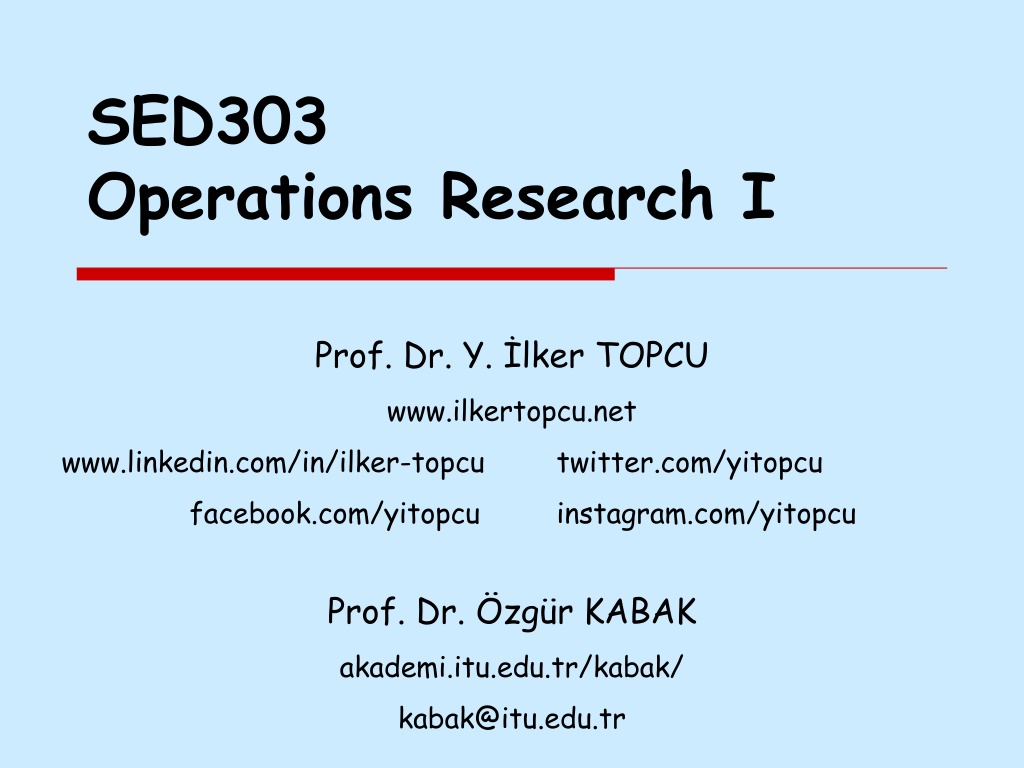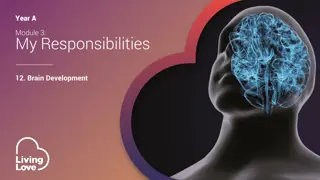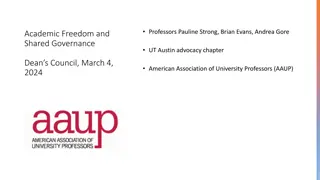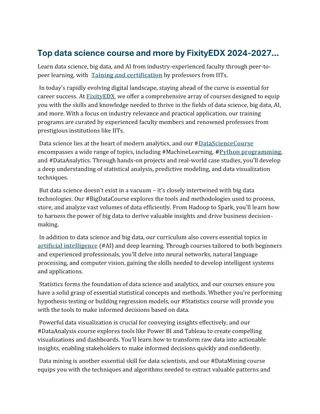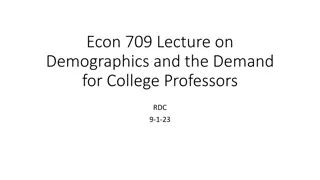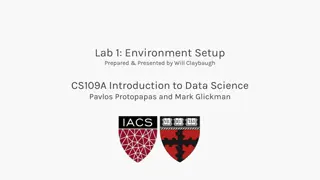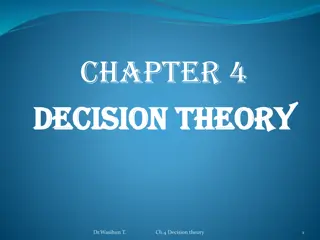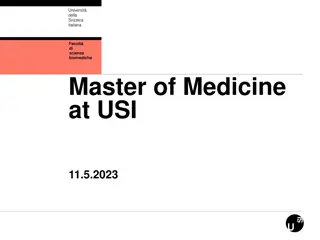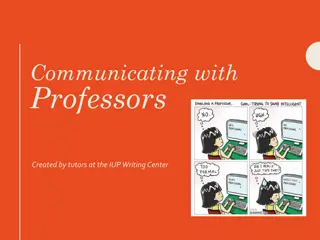Operations Research and Decision Making: Professors Y. Topcu and Z. Kabak
World of Operations Research and Decision Making with insights from Prof. Dr. Y. Topcu and Prof. Dr. Z. Kabak. Learn about mathematical programming, modeling complex systems, fuzzy and group decision making, and more. Dive into their research interests, academic backgrounds, and contributions to the field. Discover courses covering linear programming, sensitivity analysis, transportation models, and decision analysis. Stay informed about the latest advancements in industrial engineering and management science through their expertise.
Download Presentation

Please find below an Image/Link to download the presentation.
The content on the website is provided AS IS for your information and personal use only. It may not be sold, licensed, or shared on other websites without obtaining consent from the author. Download presentation by click this link. If you encounter any issues during the download, it is possible that the publisher has removed the file from their server.
E N D
Presentation Transcript
SED303 Operations Research I Prof. Dr. Y. lker TOPCU www.ilkertopcu.net www.linkedin.com/in/ilker-topcu facebook.com/yitopcu twitter.com/yitopcu instagram.com/yitopcu Prof. Dr. zg r KABAK akademi.itu.edu.tr/kabak/ kabak@itu.edu.tr
Prof. Dr. zgr Kabak Office address Phone (212) 293 1300 /2073 secretary Web site https://akademi.itu.edu.tr/kabak/ E-mail address kabak@itu.edu.tr
Prof. Dr. zgr Kabak Professor at Industrial Engineering department of ITU (2021) Post-doc studies at Belgium Nuclear Research Centre (SCK.CEN) (2009-2010) A fuzzy multi attribute decision making approach for nuclear safeguards information management Ph.D. in ITU Industrial Engineering programme (2008) Modeling supply chain network using possibilistic linear programming and an application Research interests Operations Research (Mathematical programming) Modeling complex systems Fuzzy and Group decision making
Prof. Dr. Y. lker Topcu Office address Phone (532) 355 5045 mobile Web site www.ilkertopcu.net, www.linkedin.com/in/ilker-topcu/ twitter.com/yitopcu, facebook.com/yitopcu, instagram.com/yitopcu E-mail address ilker.topcu@itu.edu.tr
Prof. Dr. Y. lker Topcu Professor at Industrial Engineering department, ITU (2011- ) Visiting Professor at The Joseph M. Katz Graduate School of Business, University of Pittsburgh (2018-2019) Ph.D. in ITU Engineering Management program (2000) Visiting Researcher at Centre for Decision Research of Leeds University Business School (1998-1999) Research interests Decision Analysis, Multi Criteria Decision Making, Group Decision Making Operations Research / Management Science Logistics Management, Ethics in OR, Business Ethics, Transp n, Energy, Bidding and Tender Systems, Scheduling
Course Information Credits: ECTS Credits: 7 Type: Language: 3+0 Compulsory English Web site: web.itu.edu.tr/topcuil/ya/SED303 ninova.itu.edu.tr
Course description Decision making, Model building, Modeling philosophy Linear programming Graphical solution, Simplex algorithm, M method, Two phase simplex, Dual simplex, Revised simplex Lindo and Excel solver, OpenSolver, GAMS Duality, Sensitivity analysis, Complementary slackness Transportation models and solving methods, Transshipment, Assignment
Course objectives 1. To use different mathematical modeling techniques utilizing Operations Research (OR) methodology 2. To learn various methods that are used for quantitative decision making 3. To find optimal solutions to problems
Course learning outcomes Students who pass the course will be able to 1. use different mathematical modeling techniques 2. solve a problem modeled with LP 3. comprehend the solution of an LP model 4. understand the sensitivity of a solution to the changes at the parameters of the problem 5. use some computer software to model, solve and analyze a linear model 6. identify whether a solution is optimal or not 7. solve and analyze transportation and assignment problems with related methods
References Text book Winston W.L. (2004) Operations Research: Applications and Algorithms , Brooks/Cole Thomson Learning Web site of the course Up-to-date lecture notes and supplements Solutions to exams and homework Previous exam questions Books Operations Research , "Practical Management Science", "Introduction to Management Science , "Quantitative Analysis for Management , "Optimization in Operations Research", "Introduction to Mathematical Programming Online courses, video recordings, and web sites of other courses
Assessments 2 Homework assignments 2 Midterm exams Final exam 20% 40% 40%
Thresholds If you do not complete the following requirements, you will receive a letter grade VF: One of your midterm exam grades must be more than 30 One of your HW assignment grades must be more than 50 If your final exam grade is less than 30 or if your average grade is less than 40, you will receive a letter grade FF
Cheating and Plagiarism Do not! Studying together to understand the material is fine, but the work you hand in is to be your own. No cheating will be tolerated: A letter grade of F will be given! You can constitute a group to submit homework assignments. You may submit a unique report for your group (of course plagiarism among assignment groups is strictly forbidden).
Homework Assignments Group assignment (max. 3 students) Distributed and collected via Ninova by RA/TA s. Duration: 2 weeks HW1 Modeling & Softwares Dates: Oct. 22 Nov. 5 HW2 Solutions & Senstivity Analysis Dates: Dec. 10 Dec. 24
Midterm Exams Will be held in classroom Duration: 90-120 minutes Midterm Exam 1 Topics covered in the first six weeks November 12 Midterm Exam 2 Topics covered after the 7th week January 7
Final Exam Will be held in classroom Duration: 90-120 minutes All topics covered Date: TBA
Schedule Date Oct. 1 Oct. 8 Oct. 15 Oct. 22 Oct. 29 Nov. 5 Nov. 12 Nov. 19 Nov. 26 Dec. 3 Dec. 10 Dec. 17 Dec. 24 Dec. 31 Jan. 7 Subject Introduction to OR, Linear Programming, Modeling Modeling, Graphical Solution, Software Packages Simplex Algorithm, Big M Method Two-phase Simplex; HW1 Republic Day Sensitivity Analysis (Software, Graphic, 100%) Midterm Exam I Fall Break Duality, Duality and Sensitivity Complementary Slackness, Dual Simplex Revised Simplex; HW2 Utilizing Simplex for Sensitivity Formulating Transportation Problems, Finding Basic Feasible Sol n Transportation Simplex Method, Transshipment & Assignment Problems Midterm Exam II
